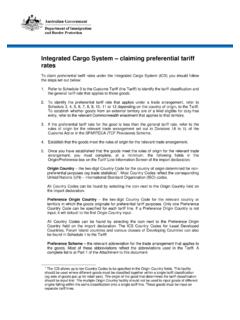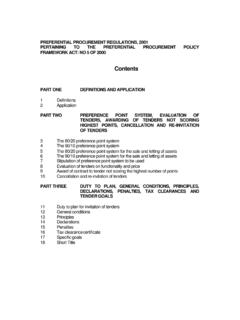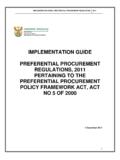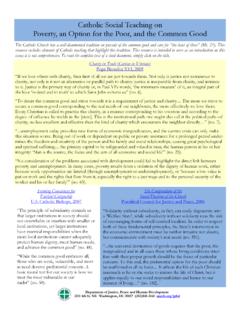Transcription of PREFERENTIAL PROCUREMENT POLICY FRAMEWORK ACT …
1 PREFERENTIAL PROCUREMENT POLICY FRAMEWORK ACTNO. 5 OF 2000[View Regulation][ASSENTED TO 2 FEBRUARY, 2000][DATE OF COMMENCEMENT: 3 FEBRUARY, 2000](English text signed by the President)ACTTo give effect to section 217 (3) of the Constitution by providing a FRAMEWORK for theimplementation of the PROCUREMENT POLICY contemplated in section 217 (2) of the Constitution;and to provide for matters connected OF for implementation of PREFERENTIAL PROCUREMENT title1. Definitions. In this Act, unless the context indicates otherwise acceptable tender means any tender which, in all respects, complies with the specificationsand conditions of tender as set out in the tender document; Minister means the Minister of Finance; organ of state means (a) a national or provincial department as defined in the Public Finance Management Act,1999 (Act No.)
2 1 of 1999); (b) a municipality as contemplated in the Constitution; (c) a constitutional institution defined in the Public Finance Management Act, 1999 (ActNo. 1 of 1999); (d) Parliament; (e) a provincial legislature; ( f ) any other institution or category of institutions included in the definition of organ ofstate in section 239 of the Constitution and recognised by the Minister by notice inthe Government Gazette as an institution or category of institutions to which this Actapplies; PREFERENTIAL PROCUREMENT POLICY means a PROCUREMENT POLICY contemplated in section 217 (2)of the Constitution; prescribed means prescribed by regulation made under section 5; this Act includes any regulations made under section FRAMEWORK for implementation of PREFERENTIAL PROCUREMENT POLICY .
3 (1) An organ ofstate must determine its PREFERENTIAL PROCUREMENT POLICY and implement it within the followingframework: (a) A preference point system must be followed; (b) (i) for contracts with a Rand value above a prescribed amount a maximum of 10points may be allocated for specific goals as contemplated in paragraph (d)provided that the lowest acceptable tender scores 90 points for price; (ii) for contracts with a Rand value equal to or below a prescribed amount amaximum of 20 points may be allocated for specific goals as contemplated inparagraph (d) provided that the lowest acceptable tender scores 80 points forprice; (c) any other acceptable tenders which are higher in price must score fewer points, on apro rata basis, calculated on their tender prices in relation to the lowest acceptabletender, in accordance with a prescribed formula; (d) the specific goals may include (i) contracting with persons, or categories of persons, historically disadvantaged byunfair discrimination on the basis of race, gender or disability; (ii) implementing the programmes of the Reconstruction and DevelopmentProgramme as published in Government Gazette No.
4 16085 dated 23 November1994; (e) any specific goal for which a point may be awarded, must be clearly specified in theinvitation to submit a tender; ( f ) the contract must be awarded to the tenderer who scores the highest points, unlessobjective criteria in addition to those contemplated in paragraphs (d) and (e) justify theaward to another tenderer; and (g) any contract awarded on account of false information furnished by the tenderer inorder to secure preference in terms of this Act, may be cancelled at the sole discretionof the organ of state without prejudice to any other remedies the organ of state mayhave.(2) Any goals contemplated in subsection (1) (e) must be measurable, quantifiable andmonitored for Exemption.
5 The Minister may, on request, exempt an organ of state from any or all theprovisions of this Act if (a) it is in the interests of national security; (b) the likely tenderers are international suppliers; or (c) it is in the public Transitional provision. Any PROCUREMENT process implemented under a preferentialprocurement POLICY where the invitation to tender was advertised before the commencement of thisAct, must be finalised as if this Act had not come into Regulations. (1) The Minister may make regulations regarding any matter that may benecessary or expedient to prescribe in order to achieve the objects of this Act.(2) Draft regulations must be published for public comment in the Government Gazette andevery Provincial Gazette before Short title.
6 This Act is called the PREFERENTIAL PROCUREMENT POLICY FRAMEWORK Act, PROCUREMENT POLICY FRAMEWORK ACT5 OF 2000 REGULATIONSGN R725 of 10 August 2001: RegulationsARRANGEMENT OF REGULATIONSPART ONEDEFINITIONS AND TWOPREFERENCE POINT SYSTEM, EVALUATION OF TENDERS, AWARDING OF TENDERSNOT SCORING HIGHEST POINTS, CANCELLATION AND RE-INVITATION OF 80/20 preference point 90/10 preference point 80/20 preference point system for the sale and letting of 90/10 preference point system for the sale and letting of of preference point system to be of tenders on functionality and of contract to tender not scoring the highest number of and re-invitation of tendersPART THREEDUTY TO PLAN, GENERAL CONDITIONS, PRINCIPLES, DECLARATIONS, PENALTIES,TAX CLEARANCES AND TENDER to plan for invitation of clearance titleThe Minister of Finance has.
7 In terms of section 5 of the PREFERENTIAL PROCUREMENT PolicyFramework Act, 2000 (Act No. 5 of 2000), made the regulations contained in the ONEDEFINITIONS AND APPLICATION1. Definitions. In these regulations, unless the context indicates otherwise, a word orexpression to which a meaning has been assigned in the Act bears the same meaning, and (a) Act means the PREFERENTIAL PROCUREMENT POLICY FRAMEWORK Act, 2000 (Act No. 5 of2000); (b) Agent means a person mandated by another person ( the principal ) to do businessfor and on behalf of, or to represent in a business transaction, the principal, andthereby acquire rights for the principal against an organ of state and incur obligationsbinding the principal in favour of an organ of state; (c) Comparative price means the price after the factors of a non-firm price and allunconditional discounts that can be utilised have been taken into consideration.
8 (d) Consortium or Joint Venture means an association of persons for the purpose ofcombining their expertise, property, capital, efforts, skill and knowledge in an activityfor the execution of a contract; (e) Contract means the agreement that results from the acceptance of a tender by anorgan of state; ( f ) Disability means, in respect of a person, a permanent impairment of a physical,intellectual, or sensory function, which results in restricted, or lack of, ability toperform an activity in the manner, or within the range, considered normal for a humanbeing; (g) Firm price is the price that is only subject to adjustments in accordance with theactual increase or decrease resulting from the change, imposition, or abolition ofcustoms or excise duty and any other duty, levy, or tax which, in terms of a law orregulation is binding on the contractor and demonstrably has an influence on the priceof any supplies, or the rendering costs of any service, for the execution of the contract.
9 (h) Historically Disadvantaged Individual (HDI) means a South African citizen (1) who, due to the apartheid POLICY that had been in place, had no franchise innational elections prior to the introduction of the Constitution of the Republic ofSouth Africa, 1983 (Act No. 110 of 1983) or the Constitution of the Republic ofSouth Africa, 1993 (Act No. 200 of 1993) ( the Interim Constitution ); and/or (2) who is a female; and/or (3) who has a disability: Provided that a person who obtained South African citizenship on or after the comingto effect of the Interim Constitution, is deemed not to be an HDI; (i) Management in relation to an enterprise or business, means an activity inclusive ofcontrol and performed on a daily basis, by any person who is a principal executiveofficer of the company, by whatever name that person may be designated, and whetheror not that person is a director; ( j) Non-firm prices means all prices other than firm prices.
10 (k) Person includes reference to a juristic person; (l) Rand value means the total estimated value of a contract in Rand denominationwhich is calculated at the time of tender invitations and includes all applicable taxesand excise duties; (m) Small, Medium and Micro Enterprises (SMMEs) bears the same meaningassigned to this expression in the National Small Business Act, 1996 (Act No. 102 of1996); (n) Sub-Contracting means the primary contractor s assigning or leasing or makingout work to, or employing, another person to support such primary contractor in theexecution of part of a project in terms of the contract; (o) Tender means a written offer or bid in a prescribed or stipulated form in responseto an invitation by an organ of state for the provision of services or goods; (p) Trust means the arrangement through which the property of one person is madeover or bequeathed to a trustee to administer such property for the benefit of anotherperson.







